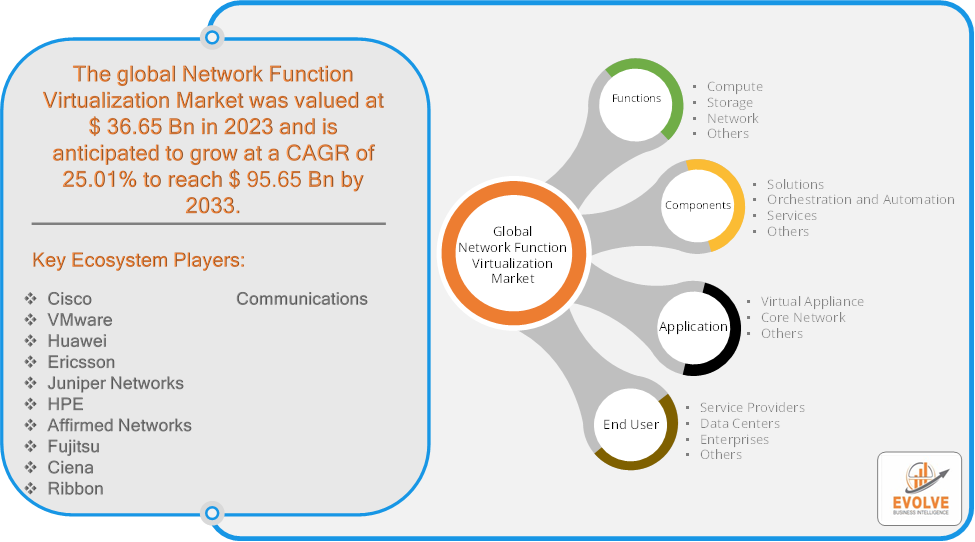NFV Market Soars: 25.01% CAGR Forecast

Evolve Business Intelligence has published a research report on the Global Network Function Virtualization Market, 2023–2033. The global Network Function Virtualization market is projected to exhibit a CAGR of around 25.01%during the forecast period of 2023 to 2033.
Evolve Business Intelligence has recognized the following companies as the key players in the global Network Function Virtualization Market: Cisco, VMware, Huawei, Ericsson, Juniper Networks, HPE, Affirmed Networks, Fujitsu, Ciena, Ribbon Communications.
 More Information: https://evolvebi.com/report/network-function-virtualization-market-analysis/
More Information: https://evolvebi.com/report/network-function-virtualization-market-analysis/
Market Highlights
The Global Network Function Virtualization market is projected to be valued at USD 95.65 Billion by 2033, recording a CAGR of around 25.01% during the forecast period. Network Function Virtualization (NFV) is a transformative technology in telecommunications that involves virtualizing network services traditionally carried out by dedicated hardware. By utilizing software to perform functions such as routing, firewalls, load balancing, and more, NFV enhances network agility, reduces operational costs, and accelerates service deployment. This approach allows for the dynamic allocation of network resources, scalability, and simplified management. It also supports the evolution of network infrastructure towards cloud-based and software-defined networks, providing greater flexibility and efficiency in responding to changing network demands.
The COVID-19 pandemic has led to supply chain disruptions leading to supply shortages or lower demand in the Network Function Virtualization market. The travel restrictions and social-distancing measures have resulted in a sharp drop in consumer and business spending and this pattern is to continue for some time. The end-user trend and preferences have changed due to the pandemic and have resulted in manufacturers, developers, and service providers adopting various strategies to stabilize the company.
Segmental Analysis
The global Network Function Virtualization market has been segmented based on Functions, Components, Application, End-User
Based on the Functions, the market is segmented based on Compute, Storage, Network, Others. the Network segment dominates, as it is critical for managing and optimizing network traffic and functions, which are central to NFV’s role in virtualizing and improving network services.
Based on Components, the market has been divided into Solutions, Orchestration, and Automation, Services, Others. the Solutions segment dominates, as it encompasses the core virtualized network functions and software needed to implement and operate NFV environments.
Based on the Application, the market has been divided into Virtual Appliance, Core Network, Others. the Core Network segment dominates, as it is crucial for enabling essential network functions such as routing, switching, and security, which are fundamental to the operation of telecommunications networks.
Based on End-User, the market has been divided into Service Providers, Data Centers, Enterprises, Others. Service Providers dominate, as they leverage NFV to enhance network agility, reduce costs, and support the deployment of new services across their vast infrastructures.
More Information: https://evolvebi.com/report/network-function-virtualization-market-analysis/
Regional Analysis
The Network Function Virtualization market is divided into five regions: North America, Europe, Asia-Pacific, South America, and the Middle East, &Africa. The Asia-Pacific region holds a dominant position in the Network Function Virtualization market. The market for network function virtualization in the Asia-Pacific region is expected to grow at the fastest rate due to the widespread use of technologies like cloud computing, Internet of Things, and Software Defined Everything (SDx). Furthermore, the region encompasses countries such as China, India, and Japan, which are expected to propel the market’s advancement due to their favorable governmental policies, growing subscriber bases, and increased demand for data storage and security. The North America region is witnessing rapid growth and emerging as a significant market for the Network Function Virtualization industry. From 2023 to 2032, the North American Network Function Virtualization Market is anticipated to expand at the quickest rate of compound annual growth (CAGR). This is because the expansion is being supported by growing technologies such as cloud computing, IoT, and Software Defined Everything (SDx). Furthermore, the Network Function Virtualization market in the United States commanded the most market share, while the market in Canada grew at the quickest rate in North America.
